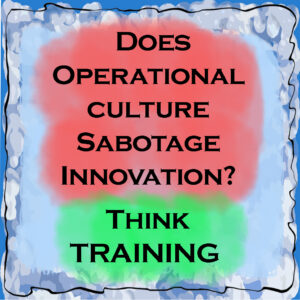Friday, February 11, 2022
Operations Can Make or Break Growth Projects
Enhance Acceptance of New Innovation With Training
Innovation teams often do their work away from the day to day action of the company. In bigger organizations they may not even be located in the same office, plant, or even city.

Operational employees often don’t even see those fun looking offices with ping pong tables and walls full of white boards.
If they do see the ping pong tables — they might resent them.
Innovation employees are trained in innovation theory and skills, even if it’s been done informally. They are true believers and do their best to come up with new ideas. Ideas that become projects, that evolve into the new services, products, methods, or processes that spell real world innovation. These teams have an eye on future growth.
It’s not this culture that needs to be more innovative — they’re already there.
Operational Culture is Powerful
New innovations fail, sometimes, because the “new thing” is not seen as helpful by everyone else. Operational cultures are powerful. In many ways this is the core corporate culture. The organization evolves from an entrepreneurial state into a production state. It needs to, that’s how profits are made.
To many ops employees, even management, new ideas are seen as an intrusion. An intrusion that prevents them from doing what they believe is their real job — cranking out the existing widget. Keeping the existing train running on time. From this perspective, innovation is looked at as off-mission and not helpful to production or profit.
Operational employees are rewarded for
not making mistakes and perfecting the status quo. They’re rewarded for
not trying things which disrupt operations. So, asking them to try something new goes against all their training and incentives. It goes against their culture. The exception is an incremental innovation which clearly, and at low risk, helps them crank out widgets faster and more error free.
But an organization needs a balance of incremental and disruptive innovation. Incremental is good but over time it’s not enough.
How might you shift operational culture to be more helpful to innovation?
Training, Incentives and Recognition Balance Culture
So, what’s the answer? Three things!
- Training. Awareness of Innovation Training. People need to understand that their long term future depends on continuous innovation.
- Incentives. Incentives for aiding the effort sends the right message.
- Recognition. When a contribution, large or small, for implementing a new innovation happens it needs to be recognized, acknowledged, and rewarded.
I
nnovation Awareness Training can start with a 90 minute workshop. Done in-person or virtually.
Provide Insight to Operational Employees & Answer These Questions:- Why do we need innovation?
- Why we need a mix of types of innovation?
- How does innovation work? What does that team do? How do they do it?
- How can I contribute even if it’s not my daily job?
- What’s in it for me? What’s in it for us?
- How might we actively assist innovation starting now?
Gregg Fraley Innovation provides this type of Innovation Awareness Training. Get in touch to schedule training. Shift your operations people to a more helpful perspective, align your culture, and grow through Innovation.
Gregg Fraley is an author and consultant, the founder of Gregg Fraley Innovation (GFi). Gregg has worked with many companies in the Fortune 1000, but also has assisted smaller businesses and start-ups in finding ways to breakout growth. He's a Visiting Innovation Scholar at Notre Dame. His business novel, "Jack's Notebook" is used in many business schools to teach structured creative problem solving.